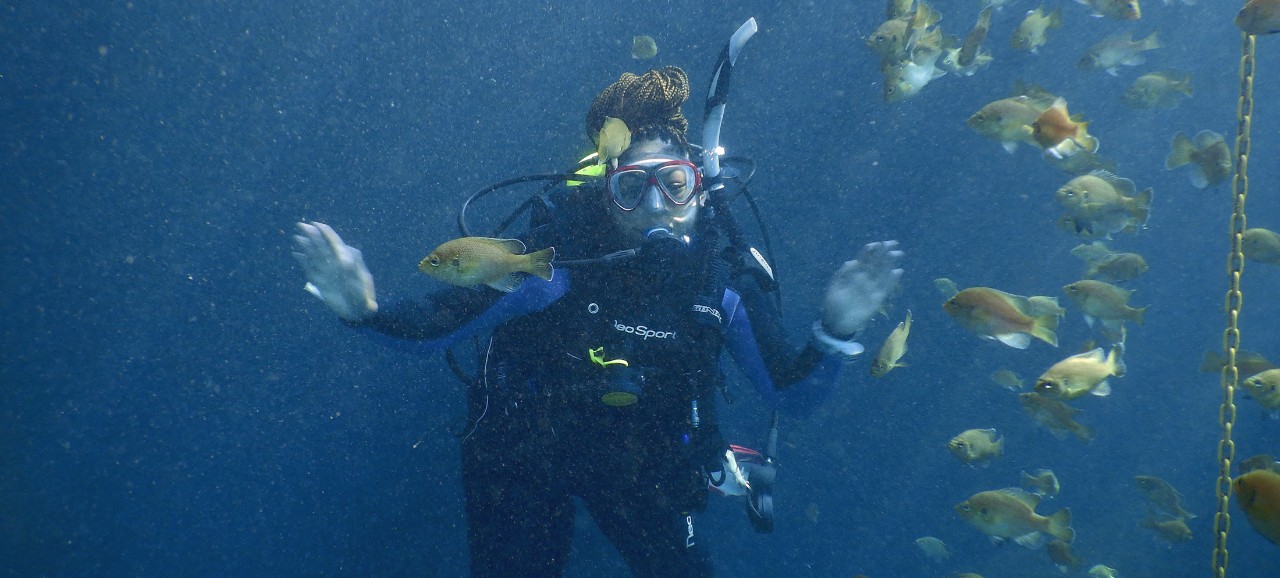


The Life Aquatic
UD Prof. Michael Birns is working to create a world of ocean advocates
June 17, 2024
“In the end, we will conserve only what we love,
we will love only what we understand, and we
will understand only what we are taught.”
- Senegalese forestry engineer Baba Dioum, 1968
Michael Birns thinks of this quote often. As UD’s diving safety officer and scuba instructor, Birns wants to create a “world of ocean advocates.”
Finance majors. Engineers. Fashion students who may someday design new wetsuits.
“Why would an investment banker in New York tell their congressperson to vote for reef preservation in Hawaii?” Birns asks. “Constituents need to see that it’s worthwhile.”

To fully appreciate the awe and wonder of the ocean, he knows, is to observe it from within, to breathe in its depths, to see, with your own two eyes, the majesty of the life around you.
“It’s like entering a whole different realm,” says Cecily Duggan, EOE25, a marine science major who discovered her love for scuba while still in high school. Now, she works alongside Birns as certified divemaster, maintaining UD’s extensive equipment and dive locker and helping Blue Hens like Kelly Logan, EOE25, embark on their underwater journey.
A fellow marine science major, Logan took her first scuba class at UD and recently joined Birns, Duggan and a dozen other students on a Winter Session course in Florida. There, the group participated in multiple dives each day (even a few at night), exploring the crystal-clear waters of Blue Grotto Springs, the state’s largest accessible underwater cavern.
It’s like entering a whole different realm."
-Cecily Duggan, EOE25

“Aquariums are one thing,” says Logan. “But to have a softshell turtle stare at you through your mask 60 feet below the surface is a whole different world.”
It’s a world that Birns wants to share with as many people as possible. He has opened his Winter Session courses to young women in the Black Girls Dive Foundation, a national nonprofit that uses scuba diving to encourage underrepresented students to pursue STEM careers. Working with UD’s Office of Institutional Equity, Birns hopes this partnership will help diversify the pipeline of highly trained marine science students.
He also wants to use the calming, weightless nature of scuba to support those with brain trauma and posttraumatic stress disorder. He envisions starting a disabled diving program for people who have lost the use of limbs, as well as their able-bodied underwater buddy.
Meanwhile, Birns is working with Prof. Art Trembanis to develop an undergraduate class on Advanced Technologies and Robotics in Scientific Diving, which would teach the fundamentals of underwater data collection.
The ocean speaks to me."
-Michael Birns

And someday he dreams, perhaps, of starting a scuba-based space exploration program at UD.
“Neutral buoyancy is as close to being in outer space as you can get without leaving the atmosphere,” Birns explains. “That’s why astronauts train underwater before they go out in space.”
Some of these are admittedly lofty goals, but Birns (or Uncle Mike, as his students affectionately call him) has a contagious zeal for all things aquatic.
“It’s rare to find someone so passionate about what they do,” says Logan, who hopes to work in shark conservation after graduation. “Capt. Birns has a story for every single thing we learn.”
Take, for instance, the vision for space training. Prior to joining UD in 2021, Birns served as a dive boat captain and assistant dive safety officer for the National Undersea Research Center in Key Largo. There, he worked with government agencies and academic researchers, including UD Profs. Mark Warner and Trembanis, who examined coral populations and studied underwater robotics, respectively.

But it was the astronauts conducting underwater experiments, in depths and durations that required 16-plus hours of decompression, that opened Birns’ mind to the possibility of space training.
“How do you turn a wrench in neutral buoyancy or zero gravity? How do you do something as simple as changing a hinge on a door? Diving can help test that out.”
Diving can also provide an education far more grounded.
“The ocean speaks to me,” he says. “I get underwater, and all of the noise goes away. You become singularly focused on your movement, your breath. You can hear your own heartbeat. You’re weightless and floating. There’s always something interesting under the next rock or around the next corner, something you haven’t seen or are seeing in a new way.”
The last time he dove off West Palm Beach, a sea turtle swam beside him. On the Gulf Stream, an eight-foot bull shark swam above him and kept on cruising. In Cozumel, Mexico, an eagle ray spread its fins and glided on the same current just an arm length away.
These are the experiences that create ocean advocates and stoke a collective passion for life under the sea. A passion that is, thanks to Capt. Birns, rising with the tide.
Contact Us
Have a UDaily story idea?
Contact us at ocm@udel.edu
Members of the press
Contact us at 302-831-NEWS or visit the Media Relations website


